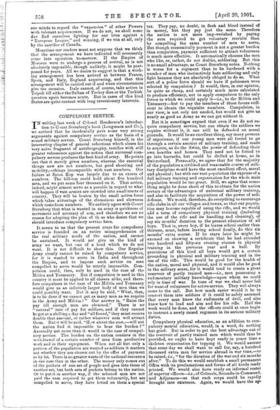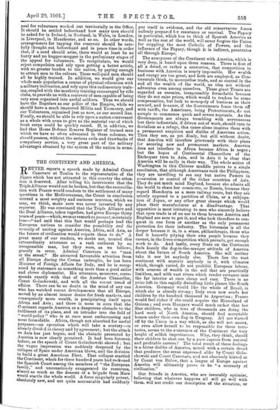COMPULSORY SERVICE.
IN writing last week of Colonel Henderson's introduc- tion to Count Sternberg's book (Loogmans and Co.), we noticed that he incidentally gave some very strong arguments against compulsory service as the basis of a sound military service. Count Sternberg himself, in the interesting chapter of general reflections which closes his very naive fragment of autobiography, testifies with still greater vehemence against the notion that universal com- pulsory service produces the best kind of army. He points out that it merely gives numbers, whereas the essential things now are not numbers, but good shooting and mobility,—things incompatible with vast numbers. Our failure at Spion Kop was largely due to an excess of numbers. The hill-top could hold about five hundred men, and we put some four thousand on it. That action, indeed, might almost serve as a parable in regard to what will happen if vast armies are crowded into small tracts of country. They will be beaten by the small active force which takes advantage of the clumsiness and slowness which come from numbers. We entirely agree with Count Sternberg that what is wanted in an army is quickness of movement and accuracy of aim, and therefore we see no reason for adopting the plan of those who desire that we should introduce compulsory service here.
It seems to us that the present craze for compulsory service is founded on an entire misapprehension of the real military needs of the nation, and cannot be sustained. It would not give us the kind of army we want, but one of a kind which we do not want. It is not difficult to show this. Our Regular Army clearly cannot be raised by compulsory service, for it is wanted to serve in India and throughout the Empire, and to impose such service on men compelled to serve would be utterly impossible. Com- pulsion could, then, only be used in the case of the Militia and Yeomanry. But if compulsion is used in this country it must be applied to all classes alike, and there- fore compulsion in the case of the Militia and Yeomanry would give us an infinitely larger body of men than we could possibly want. But it may be said, " What, then, is to be done if we cannot get as many men as we require in the Army and Militia ? " Our answer is, " Raise the pay till enough men are obtained." There is no "natural" rate of pay for soldiers, and if they cannot be got at a shilling a day and "all found," they must receive double that amount, or rather whatever sum will attract them. But it will be said, "How about the cost,—will not the nation find it impossible to bear the burden ?" Assuredly not more than it would in the case of compul- sory service. The burden on the nation consists in the withdrawal of a certain number of men from productive work and in their equipment. When not all but only a portion of the population are wanted as soldiers it matters not whether they are chosen out by the offer of payment or by lot. There is no greater waste of the national resources in one case than in the other. The money only comes out of the pockets of one set of people and goes into those of another set, but both sets of pockets belong to the nation. Or to put it in another way, if the selected men are not paid the sum required to get them voluntarily, but are compelled to serve, they have levied on them a special tax. They pay, no doubt, in flesh and blood instead of in money, but they pay just the same. Therefore the nation is not more impoverished by paying the sum required to get voluntary recruits than by compelling the same number of men to serve. But though economically payment is not a greater burden than compulsion, payment sufficient to attract volunteers is much more effective. It automatically chooses the men who like, or, rather, do not dislike, soldiering. But this is no small advantage, as Count Sternberg notes. Nothing is worse for a regiment than to be burdened with a number of men who instinctively hate soldiering and only fight because they are absolutely obliged to do so. What sort of a police force should we have if policemen were selected by compulsion ? It would, then, in our opinion, be quite as cheap, and certainly much more calculated to produce efficiency, not to apply compulsion to the only forces to which we could apply it—i.e., to the Militia and Yeomanry—but to pay the members of those forces suffi- cient to obtain the requisite numbers. Compulsion, in our view, is not only not needed, but would not give us nearly as good an Army as we can get without it.
But it is sometiies argued that even if we do not re- quire compulsory service, but can obtain the soldiers we require without it, it can still be defended on moral grounds. It would be an excellent thing, say many persons of experience, if our young men were all forced to go through a certain amount of military training, and made to acquire, as do the Swiss, the power of defending their own hearths and homes. They need not be forced to go into barracks, but could be drilled at home, as in Switzerland. Personally, we agree that for the majority of the population a civilised and reasonable course of mili- tary discipline would have the most excellent effects moral and physical; but with our vast population the expense of a full military training and organisation for the whole male population would be too great. Still, we agree that some- thing might be done short of this to obtain for the nation certain of the advantages of universal military training, and also to facilitate the acquisition of the power of self- defence. We would, therefore, do everything to encourage rifle clubs in all our villages and towns, so that our popula- tion may become capable of using the rifle, and we would add a term of compulsory physical training (including the use of the rifle and its handling and cleaning), of say six months' duration to the present education of all boys. That is, every boy, if he leaves school earlier than thirteen, must, before leaving school finally, do this six months' extra course. If he stays later he might be excused on showing a certificate that he had attended two hundred and fifty-six evening classes in physical training in the previous year and a half. By provisions of this kind all boys would get a. certain grounding in physical and military training and in the use of the rifle. This would be good for the health of the nation, moral and physical, and it would also be good in the military sense, for it would tend to create a great reservoir of partly trained men—i.e., men possessing a rudimentary military knowledge—upon whom we could rely in time of war. In time of war we shall never fail for want of volunteers for active service. They will always come to the call. But how much easier would it be to convert them into soldiers if it could be safely assumed that every man knew the rudiments of drill, and also knew how to load and aim and fire his rifle. Half the work would be done, and the officers could at once begin to instruct a newly raised regiment in its serious military duties.
Compulsory physical education, as an addition to com- pulsory mental education, would, in a word, do nothing but good. But in order to get the best advantage out of the reservoir of partly trained men which would thus be provided, we ought to have kept ready in peace time a skeleton organisation for tapping it. We would assume that some day we shall want to call for, say, a hundred thousand extra men for service abroad in war time,—to be raised, i.e., "for the duration of the war and six months after." To do this we would establish a small permanent Office with its proclamations and forms of all kinds ready printed. We would also have ready an informal roster of superior officers—i.e., of Colonels, Seconds-in-Command, and Adjutants—so that each corps could be rapidly brought into existence. Again, we would have the ar peal for volunteers worked out territorially in the Office. It-should be settled beforehand how many men should be asked for in Ireland, in Scotland, in Wales, in London, in Liverpool, in Manchester, and so on. In other words, arrangements for tapping the reservoir should be care- fully thought out beforehand and in peace time in order that, if a need should arise, there would at least be no hurry and no hugger-mugger in the preliminary stages of the appeal for volunteers. To recapitulate, we would reject compulsion and rely upon getting a better article, with no greater burden to the nation, by paying enough to attract men to the colours. These well-paid men should all be highly trained. In addition, we would give our whole male population a course of physical education with a military inclination,and rely upon this rudimentary train- ing, coupled with the musketry training encouraged by rifle clubs; to provide us with a reservoir of men capable of being very soon organised into useful soldiers. Thus we should have the Regulars as our police of the Empire, while we should have a much improved Militia and Yeomanry, and our Volunteers, organised just as now, as our second line. Finally, we should be able to rely upon a nation conversant as a whole with arms to give us the material out of which fresh corps could be quickly raised. If, in addition, we had that Home Defence Reserve Register of trained men which we have so often advocated in these columns, we should possess, without the serious evils and drawbacks of compulsory service, a very great part of the military advantages obtained by the system of the nation in arms.







































 Previous page
Previous page